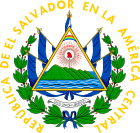Elections in El Salvador
This article needs additional citations for verification. (March 2012) |
 |
|---|
|
|
The government of El Salvador is a presidential representative democratic republic.
Salvadorans also elect a single-chamber, unicameral national
Political culture
El Salvador has a
Geographically, the departments of the Central region, especially the capital and the coastal regions, known as departamentos rojos, or red departments, are relatively leftist, and have traditionally supported the FMLN. The departamentos azules, or blue departments in the east, western and highland regions are relatively conservative, have traditionally supported ARENA, but since the 2019 presidential election, has transitioned to supporting Nuevas Ideas.
In February 2021, El Salvador's legislative election was an important breakthrough. The new party, founded by President Nayib Bukele, Nuevas Ideas, won around two-thirds of votes with its allies (GANA-New Ideas). His party won supermajority 56 seats in the 84-seat parliament. Bukele became the country’s most powerful leader in three decades.[1]
Schedule
Election
| Position | 2023 | 2024 | 2025 | 2026 | 2027 | 2028 | 2029 | 2030 |
|---|---|---|---|---|---|---|---|---|
| Type | None | Presidential (February) Legislative Assembly (February) Municipalities (March) PARLACEN (March) |
None | Legislative Assembly Municipalities PARLACEN |
None | Presidential | Legislative Assembly Municipalities PARLACEN | |
| President and Vice President |
None | President and Vice President | None | President and Vice President | None | |||
| Legislative Assembly | None | All 60 seats | None | All 60 seats | None | All 60 seats | ||
| Municipalities | None | All 44 seats | None | All 44 seats | None | All 44 seats | ||
| PARLACEN | None | All 20 seats | None | All 20 seats | None | All 20 seats | ||

